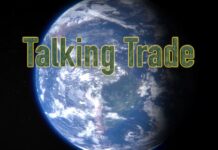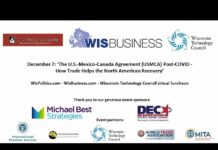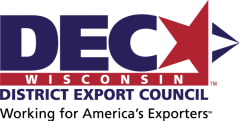Businesses urged to be diligent and careful in navigating sanctions
Panelists say Biden administration’s Indo-Pacific trade framework could boost Wisconsin
 Trade experts in a WisBusiness.com virtual trade luncheon said the Biden administration’s Indo-Pacific trade framework could lead to economic growth for Wisconsin despite continuing tensions with China.
Trade experts in a WisBusiness.com virtual trade luncheon said the Biden administration’s Indo-Pacific trade framework could lead to economic growth for Wisconsin despite continuing tensions with China.
President Biden in May announced the framework aiming to combat inflation and lower costs. Partners of the trade initiative include: the United States, Australia, Brunei, India, Indonesia, Japan, Republic of Korea, Malaysia, New Zealand, the Philippines, Singapore, Thailand and Vietnam. Critics have noted the absence of Taiwan and Canada.
Tom Still, event moderator and Wisconsin Tech Council president, noted 15 percent of state exports in 2021 were tied to one of the countries in the Indo-Pacific framework.
The initiative is not a trade agreement, but a format for future discussions on trade and could lead to trade negotiations. The framework is based on four pillars: connected economy, resilient economy, clean economy and fair economy.
Katy Sinnott, vice president of global trade and investment with the Wisconsin Economic Development Corporation, said the framework will boost discussion with the federal government and open new doors for the state that are “sometimes hard to open,” including in e-commerce and agriculture.
Sinnott also said the framework could bring growth in the machinery, medical and scientific instruments sectors.
“There’s a hope that barriers will be reduced. There will be more transparency in the trade so that our companies won’t be as concerned about possibilities of not getting paid or having the product not land as it should,” Sinnott said.
See the full story here.
Edge co-op applauding passage of Ocean Shipping Reform Act
Baldwin says federal bill aims to bolster U.S. supply chains
Concerns raised about solar imports investigation
Renew Wisconsin is raising concerns about a federal investigation into “alleged unfair trade practices” targeting solar energy products imported from southeast Asia.
The renewable energy advocacy group highlighted the U.S. Commerce Department’s investigation into certain solar products imported from Cambodia, Malaysia, Thailand and Vietnam. A release notes 80 percent of all U.S. solar panel imports come from these countries.
The investigation was launched in response to a complaint by a California manufacturer called Auxin Solar, which argued the imports from the four southeast Asian countries represent “pervasive backdoor dumping” by China, the Associated Press reported.
If the federal agency determines rules aimed at blocking products from China are being violated, Renew Wisconsin says “very high tariffs” will likely be enacted on these products, putting many solar projects in jeopardy.
See the full story here.
Former ambassador sees opportunity for Wisconsin ag amid supply chain disruption

The head of Wisconsin Manufacturers and Commerce warns rising energy costs tied to the war between Russia and Ukraine will impact factories and consumers in the state.
WMC President and CEO Kurt Bauer said in a statement the immediate impact of Russia’s invasion of Ukraine will drive energy costs “even higher than they already are.”
“Rising energy costs are very regressive for consumers, especially during the home heating season. But rising costs will also have a major impact on factories in a manufacturing state like Wisconsin,” Bauer said. “Higher producer costs are upstream of consumer costs, which means the Russian invasion will exacerbate existing inflationary pressures.”
Meanwhile, a trade consultant with the Wisconsin Small Business Development Center says exporters will need to prove their products will not end up in the Donetsk and Luhansk separatist regions of Ukraine, under federal sanctions.
“There is a potential upside, however, for organizations with the foresight to mobilize considering disruptive scenarios — and respond in a way that ultimately powers their performance,” the SBDC’s Chris Wojtowicz wrote in a blog post.
See the full story here.
Trusted brokers seen as key to navigating international trade
“Talking Trade” with Drew Slocum, executive for Bank of America

In the latest episode of “Talking Trade,” Bank of America executive Drew Slocum discusses how his team helps companies navigate the intricacies of international trade.
“The last 18 months, what we’ve seen companies work through has been unique, different and challenges that most of our companies have never faced all at one time,” said Slocum, senior vice president and marketing manager for the company.
The show touches on rising inflation and interest rates as well as supply chain and labor issues, along with how financial institutions and their corporate clients are grappling with these trends.
“We’ve seen borrowing ramp up quite a bit really across the board, as companies are faced with higher costs, but also as they think about trying to get ahead of inventory issues,” he said. “More advanced purchasing on inventory … trying to make sure they have the components on hand so they can meet the demand that they’re seeing.”
Policy primer: The U.S. – China relationship under the Biden administration
The course of relations between the U.S. and China continues to be a top foreign policy priority under the new Biden administration. President Biden recently singled out China as “the greatest geopolitical test” of this century. The path forward on China will now be determined by a different circle of leaders and influencers in the Biden administration than the past four years. We will see them take a different approach to addressing much of what are the same threats and challenges with China.
Click the link below for an overview provided by Michael Best Strategies on the leadership in the Biden administration influencing our policy on China, the threats and challenges the U.S. seeks to address, and what businesses can expect from the Biden administration and Congress as they take action on China.
Recent trade-related articles from WisPolitics.com/WisBusiness.com
Search WisBusiness.com: https://www.wisbusiness.com/?s=




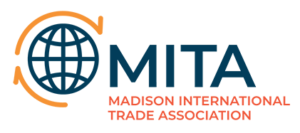 A trade compliance expert with Rockwell Automation is urging businesses to be diligent and careful as they navigate the web of international sanctions.
A trade compliance expert with Rockwell Automation is urging businesses to be diligent and careful as they navigate the web of international sanctions.

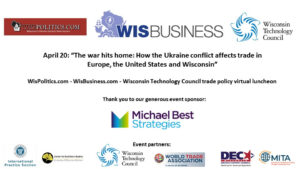 As the war in Ukraine disrupts supply chains for fertilizers, grains and other agricultural products, the head of the Wilson Center sees a chance for Wisconsin ag industries to step in.
As the war in Ukraine disrupts supply chains for fertilizers, grains and other agricultural products, the head of the Wilson Center sees a chance for Wisconsin ag industries to step in.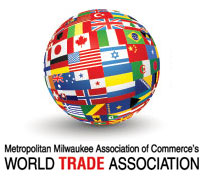 Supply chain experts on a recent webinar spoke to the importance of working with a trusted broker while navigating international trade.
Supply chain experts on a recent webinar spoke to the importance of working with a trusted broker while navigating international trade.
